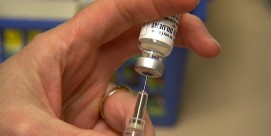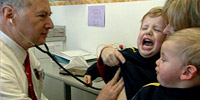Tag: Medical ethics
In most states, parents can choose not to vaccinate their children based on a personal or religious objection. It’s a choice that has begun raising concerns about the ethics of refusal and the rising risk of outbreaks. More
In most states, parents can choose not to vaccinate their children based on a personal or religious objection. It’s a choice that has begun raising concerns about the ethics of refusal and the rising risk of outbreaks. More
In La Crosse, Wisconsin, 96 percent of all adults die with a completed advance directive. The directives are often based on end-of-life conversations that reflect a patient’s spiritual and ethical values. More
When you talk about end-of-life issues, according to Gundersen Lutheran Health System’s director of clinical ethics, “you’re really talking about the meaning of life, about your religious beliefs and faith, and ultimately about who you are.” More
Expensive cancer-fighting drugs are sparking ethical debate about the tremendous costs and small benefits of some new treatments. More
Working with the Circle of Life Children’s Center, a pediatrician affiliated with the University of Medicine and Dentistry of New Jersey offers compassionate care to seriously ill children and their families. More
Historically, in most religious traditions, suicide has been considered a sin. In light of this, many survivors have felt religiously stranded. How can their faith help them heal when that same faith may fault their loved one for the act of suicide? More
Forty-six states have what are known as “conscience clauses” that allow health care workers the right to refuse to perform abortions. What concerns many women and men is that several states are now debating legislation that would expand these clauses to include not only abortion but emergency contraceptives as well. More
“There are a lot of medicines out there that have never been tested on children so it leaves the doctors high and dry in a legal quagmire, using them without FDA approval because they have evidence above 12, above 18, but not for younger children,” says pediatrician and researcher Dr. Richard Schwartz. More








